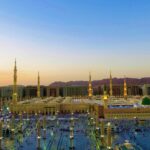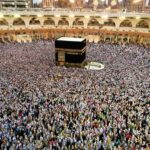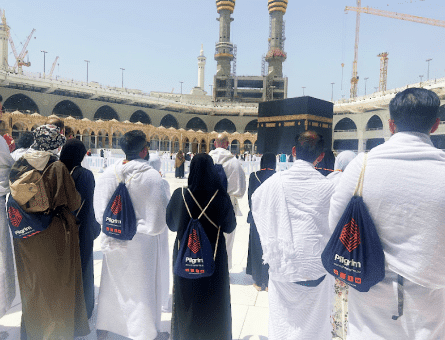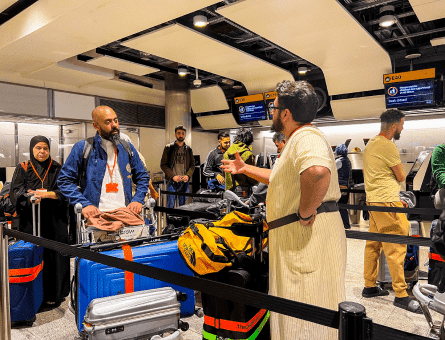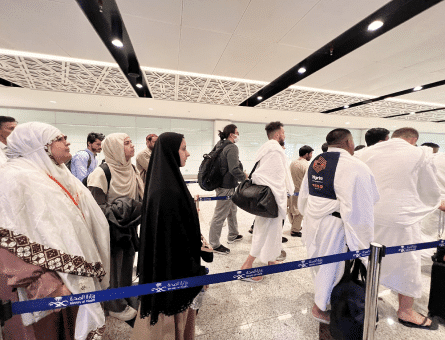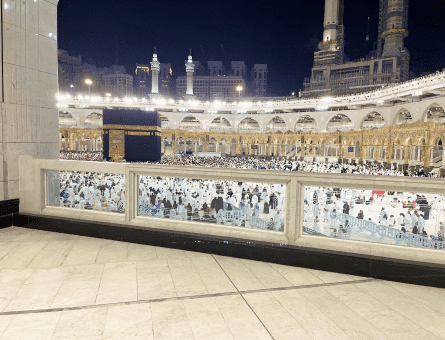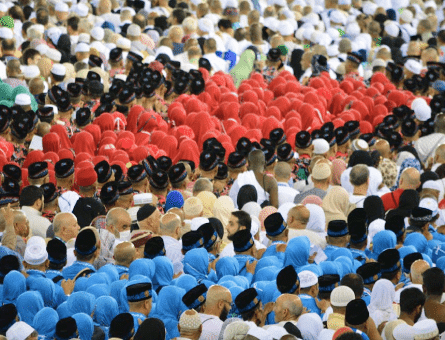Benefits of Hajj
Hajj is one of the great pillars of Islam. Allah The Almighty has made it obligatory on the Muslims who are able to find a way to do it, Saying:
Among the varieties of worship are the various pillars of Islam. Some of them are purely physical, requiring effort and movement of the body, as in the case of prayer; some of them are physical but require refraining from things that are liked, as in the case of fasting; some of them are purely financial, as in the case of Zakah; and some of them are both physical and financial, as in the case of Hajj. Hajj combines both physical and financial expenditure.
Because it involves travel and more effort than other kinds of worship, Allah (SWT) has only enjoined it once in a lifetime, and has stipulated that one must be able to do it.
Being able to do it is a condition of an action being obligatory in this case and in others, but this condition of being able to do it is emphasized more in the case of Hajj more than in other cases.
People have continued to perform the Hajj since Prophet Ibrahim raised the foundations of the House and called on people to come to it, as Allah (SWT) ordered him until our present time, and it will not stop as long as there are believers on earth.
When Allah The Almighty will seize the souls of the believers to leave only the disbelievers, who will witness the final Hour, the delegations of Hajj to the Sacred House will stop, as will be explained later.
Here’s a list of benefits intended from Hajj:
Firstly: Teaching the Muslim to honor the symbols of Allah.
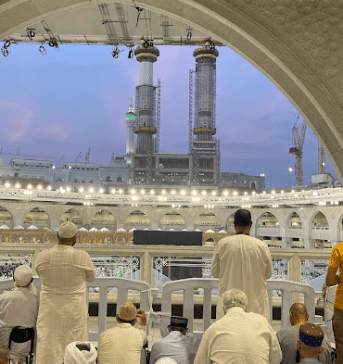
Allah (SWT) The Almighty Says:
enters it shall be safe. And (due) to Allah from the people is a pilgrimage to the House – for whoever is able to find thereto a way….” [Surah Al-Imran 3:96-97]
Secondly: Achieving compassion and love among the Muslims.
Despite the differences in language, colour, and nationality, all Muslims gather in one place, supplicate only one God, and circumambulate only one House.
This contributes to uniting their goals and purposes, and then the Muslims become like one person. The Prophet صلى الله عليه وعلى آله وسلم said:
An aspect of Hajj that also depicts this idea of unity is the wearing of Ihram by Pilgrims, as it eliminates all differences associated with societal status and wealth
The Prophet صلى الله عليه وعلى آله وسلم also said:
The Hajj reflects the aspects of the Muslims strength and unity and unveils their Shari’ah. Allah The Almighty Says:
Third: Following the example of Ibrahim and his son, Isma’il
May Allah exalt their mention, as well as the practice of Prophet Muhammad صلى الله عليه وعلى آله وسلم and recalling these memories and actions. Allah The Almighty Says:
During the course of Hajj Al-Wada‘ (The Farewell Hajj), the Prophet صلى الله عليه وعلى آله وسلم said to the people:
The Prophet صلى الله عليه وعلى آله وسلم also said:
[hadith_border]“Learn your rituals (of Hajj) from me, for I may not meet you again in this place after this year.” [Muslim]
When Muslims perform Hajj, they will be able to pay their respects to Maqam Ibrahim which is the stone on which Prophet Ibrahim (AS) stood while constructing the Kaaba. It holds significance as a symbol of the dedication and hardships faced
Fourth: Declaring the Islamic monotheism
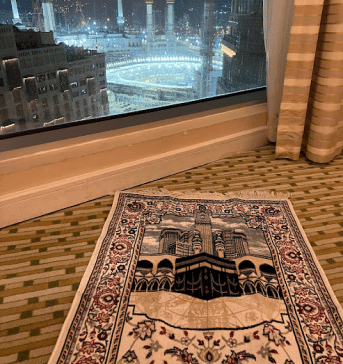
With which Allah Sent His Messengers, may Allah exalt their mention, and manifesting it through words and deeds. In the Talbiyah, the observer of the Hajj or Umrah says:
People of the pre-Islamic era used to repeat the Talbiyah, but they added polytheistic statements, saying:
“There is no other partner with You except one associate; he is Yours; You Own him and whatever he owns.”
Throughout all the rituals and actions of the Hajj, one confirms the oneness of Allah and performs them with the sole intention of obeying Allah and of following the example of the Prophet صلى الله عليه وعلى آله وسلم.
He walks and stops according to the command of Allah, shaves his hair, and slaughters his Hady (sacrificial animal for the Hajj) where Allah commands him.
In doing so, he follows the example of the Prophet صلى الله عليه وعلى آله وسلم. O Allah, provide for us so we can perform Hajj to Your House and grant us success to do what You love and what brings Your satisfaction.
The virtues of Hajj are many and variable:
1) Hajj is one of the best righteous deeds and acts of obedience
The companion Abu Hurairah narrated that the Prophet صلى الله عليه وعلى آله وسلم was asked:
Hajj equals (in reward) observing Jihad for the Sake of Allah. It is also the alternative for those who are unable to observe Jihad or those who are not obliged to observe it in the Shari’ah (Islamic Law): Aisha narrated that she said:
According to the wording of another narration, she said:
Thereupon, ‘Aisha commented:
3) Entering Paradise is the reward of the valid and accepted Hajj.
The companion Abu Hurairah narrated that the Prophet صلى الله عليه وعلى آله وسلم said:
4) A valid and accepted Hajj purifies from sins.
The Companion Abu Hurairah narrated that he heard the Prophet صلى الله عليه وعلى آله وسلم say:
According to another narration, the Prophet صلى الله عليه وعلى آله وسلم said:
5) Performing Hajj often wipes out poverty.
The companions Ibn Masud and Ibn Umar narrated that the Prophet صلى الله عليه وعلى آله وسلم said:
6) Becoming guests of Alllah
Those performing the Hajj are the guests of Allah, and He pledged to generously host and honor them. Umar narrated that the Prophet صلى الله عليه وعلى آله وسلم said:
According to the wording of another narration, the Prophet صلى الله عليه وعلى آله وسلم said:
The obligation of the Hajj will continue even after the occurrence of the great trials at the end of time. In a Hadeeth, the Prophet صلى الله عليه وعلى آله وسلم said:
When Allah will seize the souls of the believers at the end of time to leave only the disbelievers to witness the Hour, Hajj will stop. The Prophet صلى الله عليه وعلى آله وسلم said:
Thus, it is obligatory on each Muslim who is physically and financially able to hasten to perform the Hajj before he will be unable to do so. The Prophet صلى الله عليه وعلى آله وسلم said:
Glad tidings for those who are unable to perform the Hajj: There is a reward equal to the reward of Hajj. It was narrated on the authority of The companion Anas that the Prophet صلى الله عليه وعلى آله وسلم said:
Explore The New Pilgrim App
The Ultimate App
for Hajj and Umrah!






